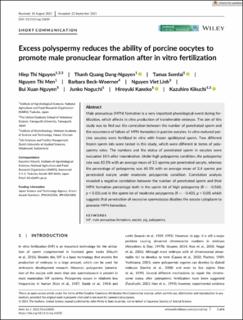Please use this identifier to cite or link to this item:
https://doi.org/10.21256/zhaw-28381Full metadata record
| DC Field | Value | Language |
|---|---|---|
| dc.contributor.author | Nguyen, Hiep Thi | - |
| dc.contributor.author | Dang-Nguyen, Thanh Quang | - |
| dc.contributor.author | Somfai, Tamas | - |
| dc.contributor.author | Men, Nguyen Thi | - |
| dc.contributor.author | Beck-Woerner, Barbara | - |
| dc.contributor.author | Viet Linh, Nguyen | - |
| dc.contributor.author | Xuan Nguyen, Bui | - |
| dc.contributor.author | Noguchi, Junko | - |
| dc.contributor.author | Kaneko, Hiroyuki | - |
| dc.contributor.author | Kikuchi, Kazuhiro | - |
| dc.date.accessioned | 2023-08-04T08:37:49Z | - |
| dc.date.available | 2023-08-04T08:37:49Z | - |
| dc.date.issued | 2021-10-26 | - |
| dc.identifier.issn | 1740-0929 | de_CH |
| dc.identifier.uri | https://digitalcollection.zhaw.ch/handle/11475/28381 | - |
| dc.description.abstract | Male pronucleus (MPN) formation is a very important physiological event during fertilization, which affects in vitro production of transferrable embryos. The aim of this study was to find out the correlation between the number of penetrated sperm and the occurrence of failure of MPN formation in porcine oocytes. In vitro matured porcine oocytes were fertilized in vitro with frozen epididymal sperm. Two different frozen sperm lots were tested in this study, which were different in terms of polyspermy rates. The numbers and the status of penetrated sperm in oocytes were evaluated 10 h after insemination. Under high polyspermy condition, the polyspermy rate was 83.5% with an average mean of 3.5 sperms per penetrated oocyte, whereas the percentage of polyspermy was 65.5% with an average mean of 2.4 sperms per penetrated oocyte under moderate polyspermic condition. Correlation analysis revealed a negative correlation between the number of penetrated sperm and their MPN formation percentage both in the sperm lot of high polyspermy (R = -0.560, p < 0.05) and in the sperm lot of moderate polyspermy (R = -0.405, p < 0.05) which suggests that penetration of excessive spermatozoa disables the oocyte cytoplasm to promote MPN formation. | de_CH |
| dc.language.iso | en | de_CH |
| dc.publisher | Wiley | de_CH |
| dc.relation.ispartof | Animal Science Journal | de_CH |
| dc.rights | http://creativecommons.org/licenses/by-nc/4.0/ | de_CH |
| dc.subject | IVF | de_CH |
| dc.subject | Male pronucleus formation | de_CH |
| dc.subject | Pig | de_CH |
| dc.subject | polyspermy | de_CH |
| dc.subject | Fertilization | de_CH |
| dc.subject | Oocytes | de_CH |
| dc.subject | Spermatozoa | de_CH |
| dc.subject | Swine | de_CH |
| dc.subject | Fertilization in vitro | de_CH |
| dc.subject | Sperm-ovum interactions | de_CH |
| dc.subject.ddc | 571: Physiologie und verwandte Themen | de_CH |
| dc.title | Excess polyspermy reduces the ability of porcine oocytes to promote male pronuclear formation after in vitro fertilization | de_CH |
| dc.type | Beitrag in wissenschaftlicher Zeitschrift | de_CH |
| dcterms.type | Text | de_CH |
| zhaw.departement | Life Sciences und Facility Management | de_CH |
| dc.identifier.doi | 10.1111/asj.13650 | de_CH |
| dc.identifier.doi | 10.21256/zhaw-28381 | - |
| dc.identifier.pmid | 34697861 | de_CH |
| zhaw.funding.eu | No | de_CH |
| zhaw.issue | 1 | de_CH |
| zhaw.originated.zhaw | Yes | de_CH |
| zhaw.pages.start | e13650 | de_CH |
| zhaw.publication.status | publishedVersion | de_CH |
| zhaw.volume | 92 | de_CH |
| zhaw.publication.review | Peer review (Publikation) | de_CH |
| zhaw.author.additional | No | de_CH |
| zhaw.display.portrait | Yes | de_CH |
| Appears in collections: | Publikationen Life Sciences und Facility Management | |
Files in This Item:
| File | Description | Size | Format | |
|---|---|---|---|---|
| 2021_Nguyen-et-al_Excess-polyspermy-reduces-the-ability-of porcine-oocytes.pdf | 1.02 MB | Adobe PDF |  View/Open |
Show simple item record
Nguyen, H. T., Dang-Nguyen, T. Q., Somfai, T., Men, N. T., Beck-Woerner, B., Viet Linh, N., Xuan Nguyen, B., Noguchi, J., Kaneko, H., & Kikuchi, K. (2021). Excess polyspermy reduces the ability of porcine oocytes to promote male pronuclear formation after in vitro fertilization. Animal Science Journal, 92(1), e13650. https://doi.org/10.1111/asj.13650
Nguyen, H.T. et al. (2021) ‘Excess polyspermy reduces the ability of porcine oocytes to promote male pronuclear formation after in vitro fertilization’, Animal Science Journal, 92(1), p. e13650. Available at: https://doi.org/10.1111/asj.13650.
H. T. Nguyen et al., “Excess polyspermy reduces the ability of porcine oocytes to promote male pronuclear formation after in vitro fertilization,” Animal Science Journal, vol. 92, no. 1, p. e13650, Oct. 2021, doi: 10.1111/asj.13650.
NGUYEN, Hiep Thi, Thanh Quang DANG-NGUYEN, Tamas SOMFAI, Nguyen Thi MEN, Barbara BECK-WOERNER, Nguyen VIET LINH, Bui XUAN NGUYEN, Junko NOGUCHI, Hiroyuki KANEKO und Kazuhiro KIKUCHI, 2021. Excess polyspermy reduces the ability of porcine oocytes to promote male pronuclear formation after in vitro fertilization. Animal Science Journal. 26 Oktober 2021. Bd. 92, Nr. 1, S. e13650. DOI 10.1111/asj.13650
Nguyen, Hiep Thi, Thanh Quang Dang-Nguyen, Tamas Somfai, Nguyen Thi Men, Barbara Beck-Woerner, Nguyen Viet Linh, Bui Xuan Nguyen, Junko Noguchi, Hiroyuki Kaneko, and Kazuhiro Kikuchi. 2021. “Excess Polyspermy Reduces the Ability of Porcine Oocytes to Promote Male Pronuclear Formation after in Vitro Fertilization.” Animal Science Journal 92 (1): e13650. https://doi.org/10.1111/asj.13650.
Nguyen, Hiep Thi, et al. “Excess Polyspermy Reduces the Ability of Porcine Oocytes to Promote Male Pronuclear Formation after in Vitro Fertilization.” Animal Science Journal, vol. 92, no. 1, Oct. 2021, p. e13650, https://doi.org/10.1111/asj.13650.
Items in DSpace are protected by copyright, with all rights reserved, unless otherwise indicated.